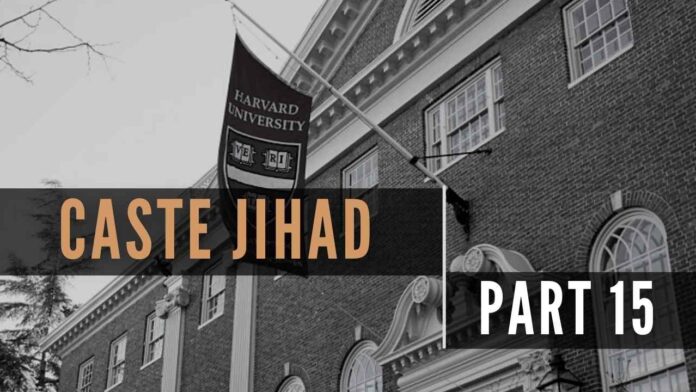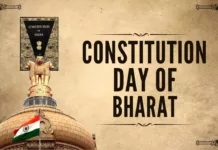
The previous 14 parts of the article can be accessed here Part 1, Part 2, Part 3, Part 4, Part 5, Part 6, Part 7, Part 8, Part 9, Part 10, Part 11, Part 12, Part 13, Part 14. This is part 15
Harvard, the first Ivy-League university to recognize caste-based discrimination, but may not be the last
In our series on caste jihad, we discussed a couple of institutions on the East coast (parts 9 and 10) followed by a series of similar actions among many California-based public institutions (parts 11-14). The most notable was the caste jihad policies approved by the Board of Trustees for 23 campuses under the California State University system (part 11). Now, we discuss none other than Harvard University, the first Ivy-League but may not be the last, to take similar steps. While the caste issue has been silently brewing in the minds of many Hinduphobic activists for years in the United States, it emerged in the open in 2020 and has engulfed many campuses.
It is important to underscore that we disavow and condemn discrimination in all forms in the education enterprise and workplace. However, it is ironic that the recent policies of including caste as a distinct category in anti-discrimination policy in itself are discriminatory against Hindu Americans. The Hindu American Foundation has eloquently spelled out why[1]. It not only affects immigrants like me but even the future generations with little or no exposure to the ill-conceived Colonial caste system. They also don’t know about India’s affirmative action policies (the reservation system) which has offered significant opportunities for the socially and economically disadvantaged sections of the society including Dalits.
In the case of Harvard University, the caste was officially enumerated as a protected category against discrimination in the graduate student’s contract. It is perhaps just the beginning at Harvard because the caste activism seems to have taken over the scholarship at this highly acclaimed institution for higher learning. We discuss one particular individual at Harvard who has been leading the caste jihad campaign to unduly make the issue bigger and more visible than necessary.
Who is this individual?
In my analysis, he is a well-educated Dalit scholar in his own right, Suraj Yengde, who came to Harvard in 2016 for graduate studies[2]. He is using his caste as a shadow and not the other way around. It is not clear if he experienced any caste-based discrimination; at least there are no documented complaints to that effect. Perhaps, his upbringing in a Dalit family in India and educational opportunities at Oxford and Harvard drove him to the discipline of social issues like caste leading to the publication of a book titled Caste Matters.
However, his scholarly activities gradually turned into caste activism at Harvard and across the United States as if Yengde began dreaming to become the modern-day Ambedkar. I wonder if he is using Harvard’s brand name to his advantage and creating a network to create a caste controversy with a herd of like-minded people and organizations. While not a fully justifiable comparison, we briefly review the similarities and differences between Yengde and Ambedkar.
The similarities include that both, Ambedkar and Yengde, are of Dalit origin, have roots in Maharashtra, studied in the U.K. and USA, and have scholarly accomplishments in their own right. One major distinction, however, is that Ambedkar was a true social reformist and nationalist who cared deeply for his people and worked tirelessly while facing the challenges and atrocities committed on Dalits during the British Raj in India. His relentless efforts to get caste discrimination outlawed in independent India and preservation of reserved seats for the so-called Scheduled Castes (SC) and Scheduled Tribes (ST) are most notable. The reserved quota system in the government jobs and educational institutions opened many doors and opportunities for the SC and ST to become active partners in Indian society.
In fact, people like Yengde are the beneficiaries of Ambedkar’s tireless efforts in transforming India’s social landscape. He deserves credit for his own hard work and persistence to get educated in India and using every opportunity to get as far as he did at the prestigious institutions abroad. One would have expected Yengde to offer credit and be thankful for Ambedkar’s affirmative action policies which accorded him the foundational education in India. However, he turned against the same system to either play a victim card as a Dalit or to fulfill a dream of becoming a modern Ambedkar in the United States.
We must not minimize isolated incidences that may have made a handful of Dalits feel uncomfortable in social settings in the U.S. However, they had no justifiable reasons to blow their horn rather than being tolerant immigrants like most of us, irrespective of our race, religion, gender, etc., who have faced humiliation and discrimination now and then. Almost all of us as Indian diaspora have stories to narrate but we have moved on as a model immigrant group socially, economically, intellectually, and politically irrespective of any “caste” consideration. Yet, people like Yengde are proving to be intolerant, indifferent, and inappropriately insulting to their homeland which gave them a lot to be thankful for if not everything.
Yengde, like many of us, has chosen to call the U.S. home, the land of plenty and opportunities. It is hard to say if Yengde plans to return to his roots for the upliftment of the struggling millions in India. This is where Yengde moved away from the ideals and activism of Ambedkar. For example, India today has drifted too far from what Ambedkar had in mind when he advocated for SC/ ST reservation for a limited duration. The whole reservation system is highly politicized which is dividing India on a caste basis.
Privileged people like Yengde could and should use their scholarship abilities, power of the pen, and intellect toward the path of reforming and reengineering the affirmative action for his fellow Dalits to bring greater semblance. For example, a Dalit family with a physician, engineer, professor, etc., in the family, should voluntarily decline the benefits of Ambedkar’s affirmative action. Let someone else use that advantage. I surmise that the voice of Yengde as an educated activist will carry weight in India. Regrettably, Yengde and many like him are no longer disadvantaged socially and economically. Why then they are pitting the diaspora – us (the so-called upper caste) versus them (the lower caste)? Is their sole motivation to earn short-term notoriety with photo ops, articles like this, magazine interviews, book offers, etc.?
Using my own U.S. experiences of over 40 years, I have not heard or seen any visible acts of caste-based discrimination. To the best of my knowledge, the caste-jihad has taken roots on many campuses with no reported cases of discrimination in academia. At present, the only infamous legal case of alleged caste-related discrimination is at Cisco which remains pending.
Every news story, particularly, after the policy change at CSU has a few prominent casts of characters and dozens more in the supporting role for staging the caste jihad. I suggest that Yengde with his relative youth, personality, and scholarly background put his energy to better use in studying India’s highly politicized caste-based reservation system and its implementation.
The new and emerging India with a focus on nation-building, youth empowerment, and a call for transforming the have-nots (Vanchit) into the haves (Sanchit) would benefit from Yengde’s scholarship. In the U.S., Yengde’s dream should include a complete stop on dividing Indian diaspora using the caste jihad and strengthening unity irrespective of one’s caste, color, creed, and/ or religious beliefs.
Note:
1. Text in Blue points to additional data on the topic.
2. The views expressed here are those of the author and do not necessarily represent or reflect the views of PGurus.
Reference:
[1] Hindu American Foundation – HAF
[2] Suraj’s Shadow: Wherever He Goes, His Caste Follows—Even in America – Feb 25, 2019, Pulitzer Center
PGurus is now on Telegram. Click here to join our channel and stay updated with all the latest news and views
For all the latest updates, download PGurus App.
- Education and election in Bharat: Race to the top - April 16, 2024
- Kejriwal: “An Insignificant Man” or a corrupt politician with impending prison term - March 24, 2024
- Bharat’s general elections and the Model Code of Conduct - March 22, 2024











[…] discriminatory against Hindu Americans. The Hindu American Foundation has eloquently spelled out why[1]. It not only affects immigrants like me but even the future generations with little or no exposure […]
Another excellent article on this caste issue in the USA.
It is all about Money, and Yangde knows it very well that in the world of wokes the one creates division and champions for its cause will be the king.